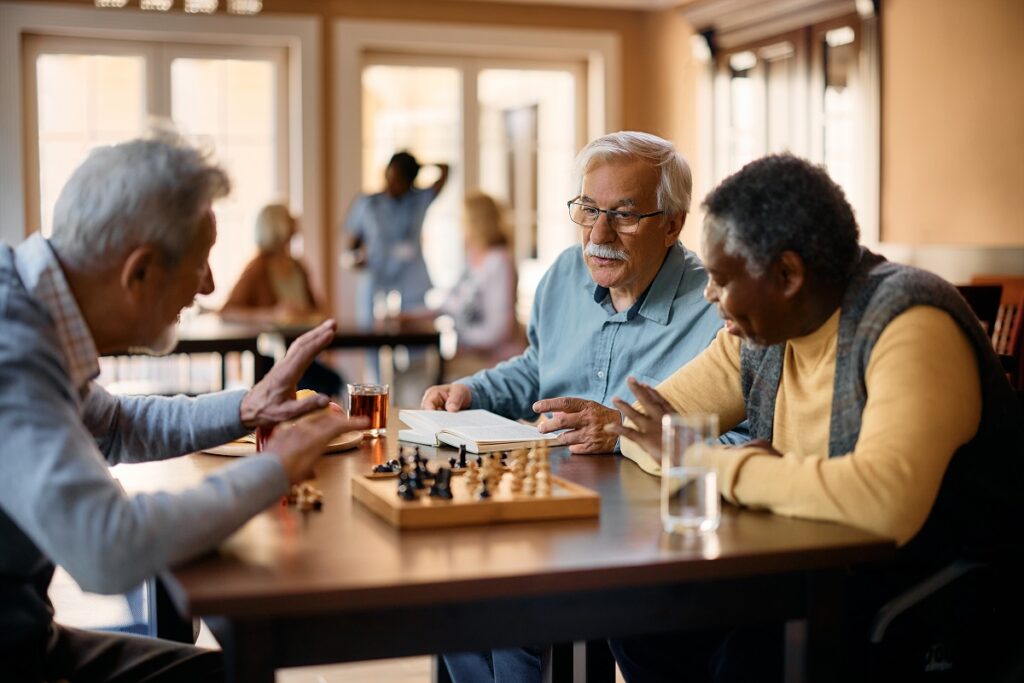Are you struggling to focus lately? Are you easily distracted or forgetful? You’re not alone. Our brains change with age, affecting our capacity to focus, recall, and absorb information fast. Here’s some good news: brain-training games increase attention and cognition.
Brain-training games may increase attention and cognitive function and be a pleasant way to keep cognitively engaged and challenged as you age. Most of the games on our list are also a great way to socialize – something many seniors lack nowadays.
Remember to maintain our thoughts busy and healthy as we age. Brain-training games are a fun way to achieve this. Let’s not waste another minute and get started ASAP!

There are many brain training games that can help boost focus, including:
Crossword Puzzles
Crosswords promote vocabulary and problem-solving.
Crossword puzzles are square or rectangular grids of white and black colored squares. Crossword puzzles need answering clues to construct words in all the white squares. Definitions provide hints, and solutions construct words that connect at black squares. Online crossword puzzles are available in newspapers, periodicals, and puzzle books. They are popular because they engage the brain and increase vocabulary and problem-solving.
Demanding prolonged attention: Crossword puzzles require constant thought about the clues, solutions, and how they fit together.
Testing logic, language, and problem-solving. This task engages and motivates the brain, improving attention.
Quieting the mind: Doing a crossword puzzle may be calming and contemplative.
Of course, crossword problems may be done according to your own schedule and anywhere, including on planes, trains, and at home. By letting you choose the optimum time and location, this flexibility helps boost attention.
Sudoku
This number-based puzzle game improves logic and focus. Everybody knows the game whether you’re a baby boomer or a part of Gen X.
Japanese number-based logic problem Sudoku. It usually has a 9×9 grid of squares separated into nine 3×3 “regions.” Each row, column, and region must include all nine numbers in Sudoku.
Sudoku is popular because anybody can play it – but also because it improves reasoning, focus, and problem-solving by exercising the brain. Sudoku puzzles are in newspapers, magazines, puzzle books, and online. They’re easy and entertaining to practice anywhere, improving attention and cognitive function.
NeuroNation
NeuroNation uses games and activities to enhance cognitive performance. The software trains memory, focus, and problem-solving. It has several cognitive skill-focused games and activities. Users may choose and monitor their games.
Web, iOS, and Android platforms all provide NeuroNation. It’s pleasant for all ages and improves cognitive performance and brain health. The best part? You don’t have to be a tech expert to enjoy this digital experience!
Brain teasers
Brain teasers and riddles encourage critical thinking and problem-solving.
Basically, brain teasers are brain-teasing puzzles or riddles. Word games, logic puzzles, arithmetic difficulties, and riddles are examples. Brain teasers are brief, but they involve critical thinking and problem-solving.
Brain teasers are enjoyable and good for cognitive function. They’re in books, periodicals, and online, and anybody can play them regardless of age and culture.
Brain Wars
Hidden object games increase visual processing and attention to detail.
Brain Wars lets players compete in mini-games that test memory, reasoning, and attention. iOS and Android support the game.
Brain Wars lets users establish profiles and play real-time online bouts against others from across the globe. Mini-games test various cognitive skills in the game. Gamers may choose and monitor their mini-games.
Brain Battles is a fun and interesting brain workout. All ages may play it anytime, anyplace.
Dual N-back
This game includes recalling a succession of sounds and visual patterns and deciding whether the present stimulus matches the one from two steps back. This game boosts working memory and focus.
Dual N-Back trains working memory and fluid intelligence. Players must recall a growing sequence of characters and numbers in this game. Players must also recall the screen’s letter and number positions and signal when a letter or number matches one from two turns ago.
The player must state if the current letter, “C,” matches the letter supplied two turns ago if the sequence is “A B C D E.” (in this case, “A”). Players must keep more knowledge in their working memory as the sequence becomes longer.
Dual N-Back may boost working memory and fluid intelligence, although data is conflicting. Some studies reported considerable gains, while others found none. Dual N-Back may also be too challenging for certain players.
Scrabble
This classic word game improves vocabulary and strategy.
Scrabble players use letter tiles to form words on a board. You have to create words using the highest-scoring letters and place them on premium squares to get the most points.
Each participant starts with a bag of letter tiles. Participants draw tiles and form words on the game board to score the highest. Players may gain extra points by putting tiles on premium squares like “double letter” or “triple word” squares. Scores depend on the word’s letter value.
Scrabble improves attention in several ways. Initially, players must identify and strategically place the highest-scoring terms. This involves attention to the letter tiles, game board, and word formation and placement.
Overall, scrabble also improves attention by making players plan. Players must evaluate their own and their opponents’ future movements to maximize score and block opponents.

Chess
Remember The Queen’s Gambit? By now it’s safe to say that this show skyrocketed chess to popularity. And that’s one of the best things ever, trust me! Why? Well, chess improves planning, decision-making, and problem-solving.
In case you didn’t know, each player controls a set of pieces in a beginning arrangement. Gamers take turns moving their pieces to capture or threaten the opponent’s king. Players must anticipate their opponents’ actions to gain an edge.
All of these strategies demand strategy, planning, and decision-making. It’s actually one of the main reasons why chess is so widely appreciated around the world.
Lumosity
This software has brain training games that increase memory, concentration, and flexibility.
Lumosity, a website, and mobile app provide brain training games and exercises to enhance memory, concentration, flexibility, speed, and problem-solving. Science-based games challenge and engage players.
Create an account and choose a customized training program. The application then offers customized games and workouts. The user may monitor their skill development.
Lumosity also lets users compete, measure daily exercise and sleep, and get individualized brain health advice. These brain training games and activities increase concentration and attention. The games challenge users and utilize their cognitive powers, improving concentration and attention over time.
These activities may demand users to rapidly spot patterns, recall lists of words, or switch jobs.
Bonus perk: Lumosity’s individualized training programs may be adapted to the user’s objectives and demands, ensuring that the games and exercises improve concentration and attention.
Conclusion
These games may improve memory and concentration, but they are just one part of brain health.
Brain health is affected by food, exercise, and other lifestyle variables. Reading, socializing, and learning may also benefit the brain.
Finding brain training games that match your age and ability level is crucial. Games that are tough but not too hard may improve certain talents better than others.
Looking for more useful content on our blog? I highly recommend our post on 6 Simple Habits That Boost Your Concentration at Any Age!








